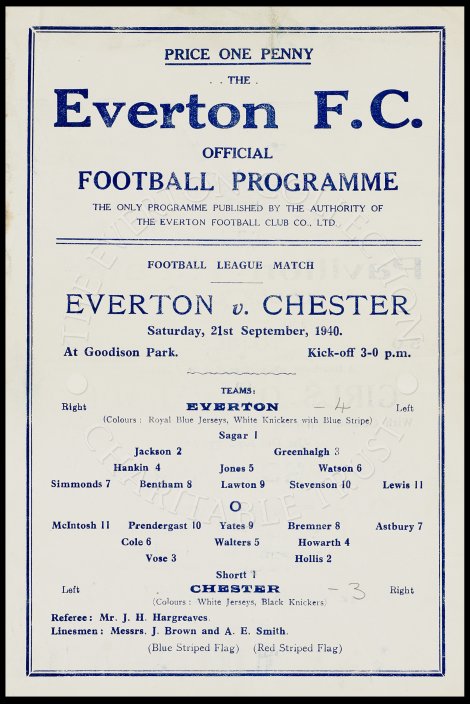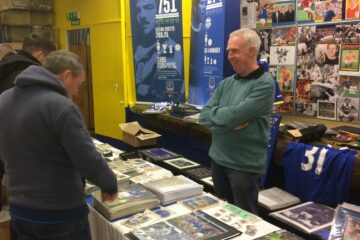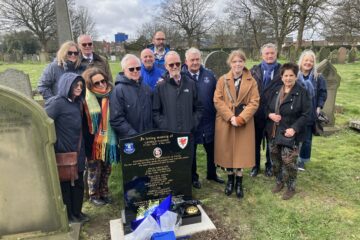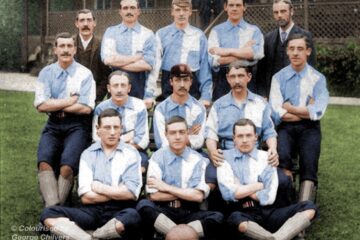Charlie Lewis had a dream
How many of us have dreamt of turning up at Goodison with our boots, blagging our way inside, finding the manager’s office, knocking on the door and asking if there is any chance of a trial, being told ‘Sure son, no problem, come right this way’, playing a blinder, outshining all the other trialists who had been invited to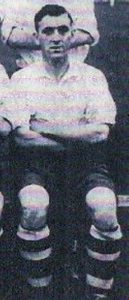 play, walking off feeling you had blown it, only for the manager, not only to take you on, but to put you straight into the first team next Saturday alongside the England centre-forward?
play, walking off feeling you had blown it, only for the manager, not only to take you on, but to put you straight into the first team next Saturday alongside the England centre-forward?
And then you woke up.
Nah, it would never happen in a million years.
But hold on, who is this young lad on the wing taking a pass from Alex Stevenson and crossing it to Tommy Lawton to bury into the net?
Charlie Lewis? Never heard of him. But he too had that dream – the difference being he actually turned it into reality. True, it was September 1940 and there was a war on, and certain allowances were being made, but as yet this was no decimated team. Ted Sagar was still in goal, Joe Mercer was still a regular, as was Tommy Lawton, T.G. Jones, and the emerging Harry Catterick. With Irish wizard Alex Stevenson on the wing, tough tackling Gordon Watson at no.6 and Norman Greenhalgh solid at left back, there were still enough first-teamers around from the 1939 championship side for this not to appear like a completely makeshift team in the newly organised wartime Football League North.
Nevertheless, young Lewis was buoyed enough to head to Goodison feeling they needed his help at such critical time, and ask the top man for a chance.
 No doubt today he would already have ‘fortune favours the brave’ tattooed across his chest, because as luck would have it, manager Theo Kelly had already organised a private trial that same evening, and eighteen year old Lewis was invited to take part. He proved to be the best player on the field, and so impressed the manager that it was decided to give him a much stiffer test that weekend. Not in the A or B teams, not even the Reserves, but straight into the first team that coming Saturday, charged with delivering crosses to Tommy Lawton. And this was no ordinary first team, but the championship side playing their fourth unbeaten game in a row, with only a couple of changes made thus far – Sagar: Cook, Greenhalgh: Mercer, Jones, Watson; Britton, Bentham, Lawton, Stevenson and …C.R. Lewis. (One of those changes was the return of centre half Tommy Jones, who was absent for the previous game against Preston after turning up to Goodison five minutes late, missing the team bus. Due to wartime rations he couldn’t get petrol to follow on by car).
No doubt today he would already have ‘fortune favours the brave’ tattooed across his chest, because as luck would have it, manager Theo Kelly had already organised a private trial that same evening, and eighteen year old Lewis was invited to take part. He proved to be the best player on the field, and so impressed the manager that it was decided to give him a much stiffer test that weekend. Not in the A or B teams, not even the Reserves, but straight into the first team that coming Saturday, charged with delivering crosses to Tommy Lawton. And this was no ordinary first team, but the championship side playing their fourth unbeaten game in a row, with only a couple of changes made thus far – Sagar: Cook, Greenhalgh: Mercer, Jones, Watson; Britton, Bentham, Lawton, Stevenson and …C.R. Lewis. (One of those changes was the return of centre half Tommy Jones, who was absent for the previous game against Preston after turning up to Goodison five minutes late, missing the team bus. Due to wartime rations he couldn’t get petrol to follow on by car).
Ahead of the game, which was against Chester, ‘Ranger’, the Liverpool Echo correspondent wrote,
‘One thing he can be sure of tomorrow, and that is that his team mates will give him every possible assistance. There isn’t a side in the country in which the comradeship and team spirit is so strong as among the Goodison brigade, thanks to Theo Kelly’s grand work and influence, and the “old-stagers” are always ready and willing to give the maximum help to newcomers. Good Luck, laddie!’
However, the day before the game, Everton were forced to make three changes. Cook, Britton, and Mercer were at very short notice required by the Army to play in their game against Notts County at Meadow-Lane. As they were actually now in the Army, and loaned back to Everton, this game took precedence. So in came Jackson for Cook, teenager Hankin at right back, and Simmons at outside right.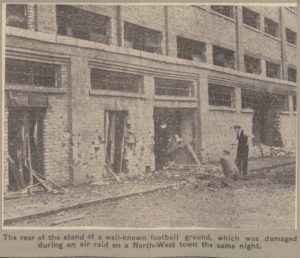
To add to the unusual circumstances of this game, it was only a few days after Charlie’s trial that the Bullens Road and Gwladys Street Stands were damaged in an air raid on the night of 18 September, and only three days before the Chester game was to take place. Due to war time restrictions, there was no mention of this in the press, apart from a reference to ‘damage to the stand of a well-known north-west football ground in a north-west town’ and no warnings at all to the home fans. These Government war time restrictions also prevented the gathering of large crowds, and many regular fans were already called up or engaged in war work. Consequently, attendances of around 5,000 were the norm, enabling the dam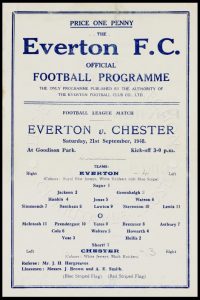 aged stands to be closed off on matchdays.
aged stands to be closed off on matchdays.
Nevertheless, the fixture went ahead, and in a classic game of two halves, Chester had the better of the first, taking the lead after only six minutes and going in 3-1 up at the break. They were clearly giving the champions a lesson, and apart from a Stevenson reply, Everton’s only other attempts were by Lewis ‘the amateur outside left, who put in two long distance drives, one of which went close’. Chester came out to be clobbered by a sixteen minute hat-trick by Tommy Lawton, thereby saving the champions’ blushes with a 4-3 victory.
And our hero Charlie? He acquitted himself well, the match report stating ‘the amateur winger, Lewis showed flashes of clever ball control and footwork and should be worth persevering with.’
And so he was persevered with, and in the next game, a 5-1 drubbing of Leeds, the match report stated ‘C.R. Lewis, the Everton winger, is making rapid progress. He deserved the many plaudits for neat and clever runs. Twice he came within an ace of notching goals.’
He featured in just three more games; in victories aga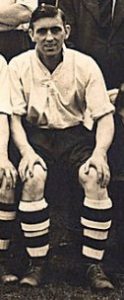 inst Southport, and Stockport, followed by the Christmas Day morning game at Anfield in a 3-1 defeat against Liverpool. But by then young Lewis had been called up to serve in the Royal Navy and had played his last game, the war interrupting what looked like a promising career. By the end of the war his chance was gone and he signed on as an amateur for South Liverpool in 1945. After a couple of seasons there, which included a benefit game against Everton at Holly Park on 23 September 1946, he moved to Halifax Town on 1 October 1947, playing until 1 May 1949.
inst Southport, and Stockport, followed by the Christmas Day morning game at Anfield in a 3-1 defeat against Liverpool. But by then young Lewis had been called up to serve in the Royal Navy and had played his last game, the war interrupting what looked like a promising career. By the end of the war his chance was gone and he signed on as an amateur for South Liverpool in 1945. After a couple of seasons there, which included a benefit game against Everton at Holly Park on 23 September 1946, he moved to Halifax Town on 1 October 1947, playing until 1 May 1949.
He may only have played five games for Everton, but how many of us would give anything for just one chance to pull on that shirt and play on the hallowed turf? The closest example in modern times to such fairy tales is the likes of Jamie Vardy’s late discovery from the lower leagues, catapulted to Premiership glory and scoring for England. But that is what dreams are made of.
Right… back to FIFA 2018, its Everton v Barcelona and I’ve got some Royden bloke up front with a number 9 on his back just burying a thirdin front of the Gwladys Street. Don’t wake me up.
(Let it be decreed that this knocking on the door and being put straight into the first team shall henceforth be known as the ‘Lewis Factor’).
Mike Royden, EFC Heritage Society

